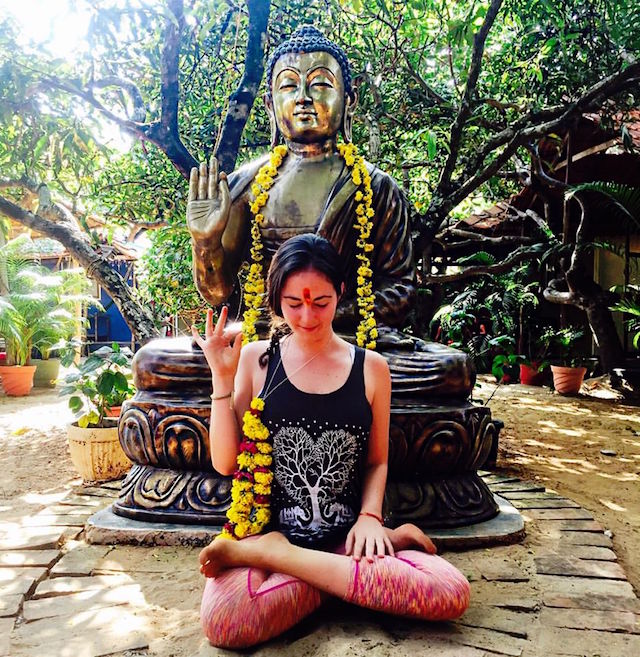
We all know the stereotypes of yogis as being granola loving, tree hugging vegans out to save the world. Although it’s frustrating to be stereotyped in any case, I’ll happily take this label over most others. However, I prefer to acknowledge myself as a yogi that tries my best to put my yoga into practice, every day. For me, this means making more mindful choices when it comes to anything from relationships, work, travel, to everything I put into my body.
Without much effort on my part, as my yoga practice continued to strengthen over the past few years, I’ve gradually cut out animal products from my diet. Like many of us vegetarians/periodic vegans can relate, I felt constantly challenged in my beliefs and in need of a strengthened stance regarding a cruelty-free diet.
Recently at the International Yoga Festival in Rishikesh, India, I was lucky enough to attend a talk on yoga and vegetarianism by Sharon Gannon, the founder of Jivamukti Yoga. Apart from her role as a yoga teacher, Sharon’s an accomplished animal rights activist and author of the book, Yoga and Vegetarianism: The Diet of Enlightenment. Attending Sharon’s interactive discussion helped me to further integrate my path of yoga and vegetarianism.
For one, us yogis usually start class with a mantra (chant): “May all beings everywhere be happy and free, and may the thoughts, words and actions of my own life contribute to that in some way.” If we full-heartedly believe in that, we’re very far along on our yoga journey. To want happiness and freedom for others in the 21st century is rare. Most people stay concerned only with themselves, their immediate family and friends. To care about those we don’t know personally is exactly the courage demanded from an aspiring yogi.
Before we can understand why a yogi would choose to be vegetarian, we need to bring to light the three major reasons a “normal person” (non-yogi) would decide to go heavy on the greens. We’ll define vegetarianism as one who eats plants and doesn’t exploit animals. In this sense, vegetarian means vegan and vegan means vegan.
First, if we are to consider ourselves environmentalists, staying clear from meat is one of the best services we can do for the prospect of a sustainable future. From methane gas, to transportation pollution, absurd water waste, agricultural degradation, and so on, eating animal products is a big F-you to the planet.
Health and morality serve as the two other main reasons an average Joe would order a black bean burger instead of his usual double bacon cheeseburger. Countless studies confirm that abstaining from animal products is better for human health, period. Despite in our face advertising, from a basic physiological level, eating eggs, milk, and meat does not necessarily promote a healthy human. We all know about the big money behind the animal product industry. (Ever heard of the “Got Milk” campaign?) From a basic ethical stance, many believe that enslaving, exploiting and hurting others should be punishable by law. If we were given the chance to avoid this kind of immorality, we’d presumably choose a plant-based diet.
Why would a yogi, in particular, choose vegetarianism? Better yet, why does being a yogi require we live a vegetarian lifestyle? Yes, it’s ironic to have to argue why it is better to be kind than cruel. Yet, it’s necessary to be so convincing in our reasons that they mean something in another’s life as directly related to their own happiness. That’s when we’ll start to see wide scale change happen.
The ultimate goal of yoga is to reach enlightenment, a point where we stop seeing others as obstacles to happiness but as living examples of a universal source, whether that be God or not. We dissolve the sense of “other” through kindness, compassion, caring, and love until we can see the goodness in all. It’s radical to apply critical thinking and challenge the fact that we shouldn’t overpower and conquer others in our society. So is the quest of the yogi.
The master of modern eight-limbed yoga, Patanjali, began the Yoga Sutras with the Five Yamas intended to guide yogis on how to restrict their behavior in relation to others. The first, ahimsa (non-violence) is pretty straight forward when it comes to the unnecessary slaughter and exploitation of animals, which causes a ripple of harm across the planet. Yogis believe that when we stop harming others, others cease to hurt us.
Satya (truthfulness) gives yogis the power to be able to say what we mean and mean what we say. Enslaving and exploiting animals started with a lie, was amplified and built upon to create the madness of the modern factory farm. Thousands of years ago when it all began, we killed the baby animals’ parents and took them in as our own. They in turn depended on the human family and trusted us. But then terrible things happened to those babies because the relationship was based on deceiving children. (Where do we suppose the Hansel and Gretel story came from?). To add to the case for Satya, today’s advertising industry is undoubtedly distorted by lies (i.e., it’s been widely debated whether milk really gives you health and strong bones).
Asteya (non-theft) requires that we do not steal life, freedom and production from animals, our earth, and the future inhabitants of this planet. Some will ask how we can eat anything at all—a fruit doesn’t necessarily belong to us. But we must eat to survive, and picking a fruit off of a natural apple tree causes less harm, and seems more natural, than killing a conscious, emotionally capable animal. Parents naturally love, so by taking their children we are stealing their ability to love and be loved. How many of us say, “I’m not getting enough love in my life?” We must make sure we’re not stealing or taking that from others, before we complain that we aren’t getting enough.
Brahmacharya (sexual fidelity) in this context refers to the rape and sexual abuse of animals used for production. Particularly, there’s a terrible process called animal husbandry used to impregnate dairy cows. The cow is chained to a wall and artificially inseminated by human hands. She then stands there for her entire pregnancy and is milked, only to be left childless and alone.
Aparigraha (non-greed) relates to the greed fundamental in the working of the capitalist meat economy. The stock market got its name from the buying and selling of shares in living beings. Let us consider the fact that most of the farmed fish aren’t eaten by humans but fed to livestock. A cow would never eat a fish, it’s just not a naturally occurring phenomenon. Fifty pounds of fish are needed to make one pound of beef. That type of manipulation is without question a byproduct of greed.
Sharon Gannon’s beautifully structured argument that yoga requires vegetarianism allowed me to bring to surface ideas I had subconsciously known to be true. As my yoga practice developed, they manifested themselves without much effort. Now, I’m more confident in my vegetarian choices than ever.
This narrative is relevant to each and every individual on the face of the earth today, yogi or not. Based on the three fundamental principles of environmental protection, human health, and ethics, the average global citizen may choose to say sayonara to animal products.
Yet, us yogis like to take it one step further, because we don’t consider ourselves the typical human being. In order to dissolve the “otherness” getting in the way of our enlightenment, we must act out of pure loving kindness. Thanks to Patanjali’s Five Yamas that begin the eight-limbed path of yoga, we have an accessible framework that helps us shape our actions in relation to others.
So, to all my granola crunching, vegan heroes and aspiring global citizens, let’s remain firm to our dream of a cruelty-free future. Let us stay inspired knowing that, in this day and age, acting out of true concern for the wellbeing and happiness of all living things is a radical step towards a global awakening.
~
Author: Shoshanna Delventhal
Editor: Travis May
Photo: Author’s Own






Read 4 comments and reply